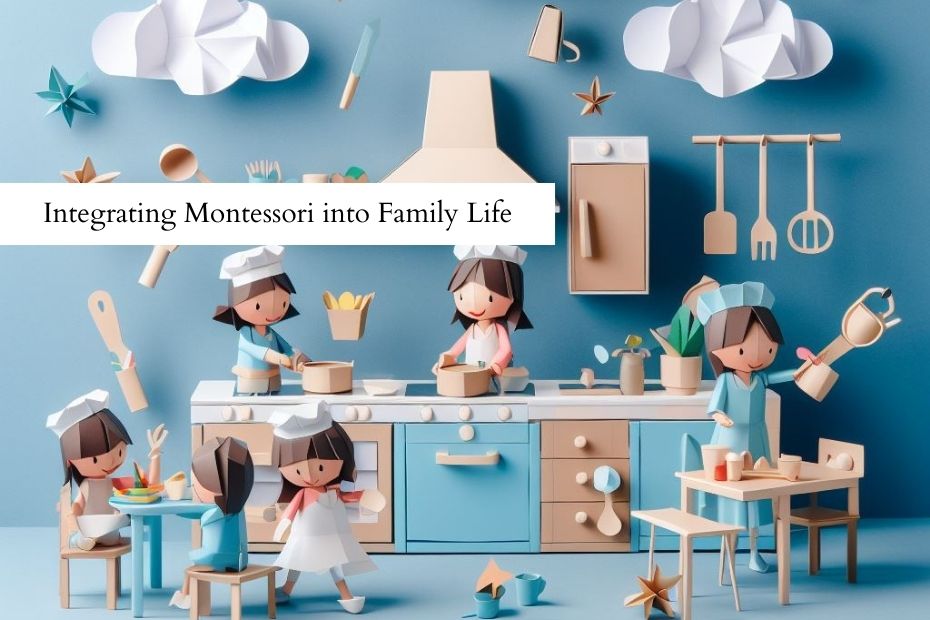Hey Montessori!
Welcome to our guide on Integrating Montessori into Family Life.
Are you seeking ways to infuse your home with the enriching principles of Montessori education?
This post is crafted to offer practical insights on how to seamlessly blend Montessori philosophy into your family’s daily routine.
Whether you’re looking to foster independence in your children, create a more harmonious and learning-focused environment, or simply enhance your family’s quality of life, this guide will provide valuable tips and solutions.
By the end of this read, you’ll be equipped with effective strategies to transform your home into a nurturing space that encourages growth, respect, and a lifelong love for learning.
Understanding Montessori Philosophy
The Core Principles
Montessori education is more than a teaching method; it’s a philosophy that can enrich family life in profound ways.
It emphasizes respect, independence, and a love for learning. Understanding these core principles is essential for integrating Montessori into your family routine.
The philosophy encourages children to explore and learn at their own pace, fostering a sense of responsibility and self-discipline.
Montessori at Home
Bringing Montessori principles into your home doesn’t require a complete overhaul. Start by creating an environment that encourages learning and independence.
This might mean organizing your child’s space to be more accessible and child-friendly.
Use shelves at their height, and provide tools and materials that they can use without constant adult intervention. This empowers them to make choices and learn through doing.
Practical Life Skills
Everyday Learning Opportunities
In a Montessori family, everyday activities become learning opportunities. Involving your children in tasks like cooking, cleaning, and gardening teaches practical life skills.
These activities not only develop their motor skills but also instill a sense of responsibility and belonging. Let your child participate in meal preparation, or give them a small area in the garden to cultivate.
This hands-on involvement is at the heart of Montessori learning.
Encouraging Independence
A key element of Montessori is fostering independence.
This can be as simple as setting up your home to allow your child to help themselves to water, snacks, or their belongings. Teach them to dress themselves, manage their hygiene, and take responsibility for their personal space.
These skills build confidence and self-reliance, crucial aspects of child development.
Integrating Montessori in Family Activities
Choosing Montessori-aligned Activities
Select activities that align with Montessori principles, like nature walks, visits to museums, or crafting sessions.
These activities should encourage exploration, observation, and questioning. It’s about the process, not the end result.
For example, during a nature walk, encourage your child to observe the environment, ask questions, and collect items that interest them.
Collaborative Learning
Incorporate collaborative activities that involve the whole family. This could be a group art project, a family cooking session, or a collaborative storytelling activity.
Such activities promote teamwork, communication, and respect for others’ ideas – all key elements in Montessori education.
Montessori Philosophy in Daily Routines
Consistency and Routine
Establishing consistent routines is fundamental in Montessori. A structured day provides a sense of security and predictability for children.
This doesn’t mean rigid schedules, but rather a predictable sequence of activities that balance learning, play, and rest.
Regular routines also help children understand time management and organization.
Respectful Communication
Montessori emphasizes respectful communication between parents and children.
This involves active listening, acknowledging feelings, and involving children in decision-making.
Such interaction fosters mutual respect and understanding, essential for a harmonious family life.
Montessori and Child Development
Supporting Individual Growth
Montessori at home means recognizing and supporting your child’s individual growth and development.
This includes observing their interests and providing materials and activities that cater to these interests.
It’s about letting the child lead their learning journey while you provide the support and environment to facilitate this.
Balancing Freedom and Boundaries
While Montessori encourages freedom, it also stresses the importance of boundaries. These boundaries should be clear, consistent, and explained with respect and understanding.
They provide a safe and structured environment for children to explore and learn.
In conclusion, integrating Montessori into family life is about creating an environment that fosters independence, respect, and a love for learning.
We found the right shelving is key to keeping your kids engaged and rotating the work materials helped to keep them focused month to mont.
It’s a journey that involves the whole family and requires patience, understanding, and commitment.
By incorporating these principles into your daily life, you create a nurturing space for your child’s holistic development.
